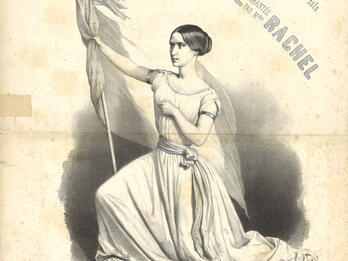Alberti: A Play in Five Acts
[From] Dramatis Personae
As Performed at the Charleston Theatre
Alberti, Commander of the Florentine Army
Lorenso D’Medici, surnamed the Magnificent
Ippolito, betrothed to Antonia
Scene—Florence, in Italy
Time—A Night and Day, 1480, A.D.
An objection is made against this piece, which I readily admit. It has neither thunder, lightning, assassination, banditti, battles, scenery, nor song to recommend it. Probably my aim was higher, or my taste not exactly conformable to the admirers of Melo-Dramatic extravaganza. Another objection has been started, namely, that to have rendered the catastrophe completely striking, Antonia should have destroyed herself in the second scene of the fifth act. I am aware that suicide, (dramatically speaking) is quite the fashion; and that a species of atheistico poetical refinement has lately usurped the place of many of our vulgar notions. But—if I am allowed to know any thing concerning beings of my own creation—I can assure the reader, (who is of course a critic) that Antonia happened to be brought up religiously and morally; and, however unhappy she might have been, she reflected too correctly to have ever contemplated such an act. It is hoped that the reader will take my word for this.
The last objection against “Alberti”—is the most formidable—it is an American production! To this charge, (as I do not know how to get over it) I must plead guilty. I have even the hardihood openly to acknowledge, nay, be proud of the accident of birth, which has placed me under the protection of laws that I revere, and in the bosom of a country that I love. It is surely time for transatlantic critics to borrow the assistance of “sweet oblivion,” and allow her to soften down those feelings and prejudices which have grown out of past hostilities. To regard the place of an author’s birth as necessarily connected with the merits or demerits of his production—to view him through that medium alone, in which smoky war—not cheerful literature—presents her votaries—may be very spirited and very national; but it would be rather difficult to convince the world, that Criticism, under such banners, can be either just, useful, or liberal. [ . . . ]
And since I find This hateful passion wrought within thee thus, That nothing else can pluck it from thy soul, But to unloose my deep and dreadful secret; Prepare to hear the cause—
Aye, speak it out! Lot forth this dread intelligence, though it blast me!
I would have kept it from thee, all in mercy, But thou thyself compellest me to speak—
O! give it utterance;—though every word Stab to my heart, that were some ease, compar’d To this dark horrible uncertainty.
Meet me at noon.
Where?
In Count Ridolpho’s gardens.—Thou dost start That I should mention that forbidden spot—But meet me there—for there I must unfold A tale will make thee feel how much thy peace Is dear to this sad heart. Mark me, at noon. Until that hour arrive I am call’d hence On a soul-trying purpose. Fare thee well. [Exit.]
What darkling horrors swim above my head,
And cloud the heavens from me! Can it be—
My father love Antonia! He, my rival!
Yes, yes; her beauty—her all-conquering beauty
Melts even his adamant—O, fatal beauty!
O, grief illimitable! Can it be?
No, no, I plague myself with horrid dreams—
He love another! he whom I have heard
Speak of my mother as one enshrin’d
And lock’d up in his heart! O, no, my father,
I wrong thy constancy. Two hours hence he said,
Would that the time were come; but he has said it,
And he makes good all pledges. [ . . . ]
My Alberti, then—For by that name I found thee, Ferdinand—
Say, of thy son——
Alas!
Ridolpho had a son too by that marriage.
He had—Ippolito——
Aye, thy son, Ippolito;
There is another mystery; the youth
Who saved my life——
Is count Ridolpho’s son, Cesario.
Ridolpho’s!
Now thou seest the sacred bar Which keeps him from Antonia.
Antonia is his sister!
By the same father; but another wife
Had sooth’d Ridolpho’s grief—Antonia’s mother.
How came Ippolito with thee? knows he—
This very hour I will make clear to thee,—
To thee and to the world—my conduct pest.
Credits
Isaac Harby, “Alberti, a Play, in Five Acts,” in A Selection from the Miscellaneous Writings of the Late Isaac Harby, Esq., ed. Abraham Moise and Henry Laurens Pinckney (Charleston: Printed by J.S. Burges, 1829), https://babel.hathitrust.org/cgi/pt?id=wu.89099757924&view=1up&seq=9.
Published in: The Posen Library of Jewish Culture and Civilization, vol. 6.



